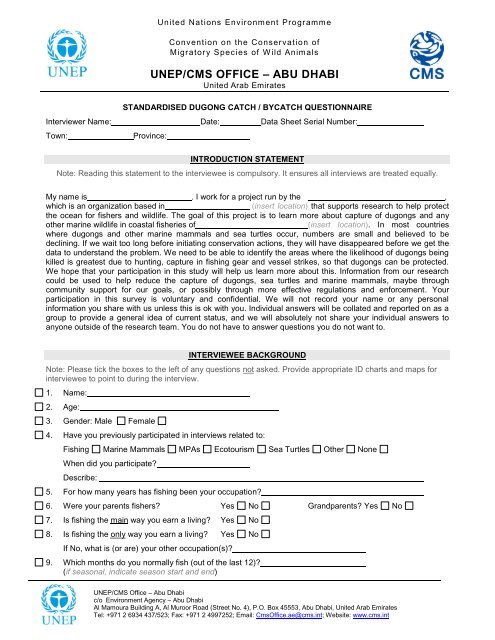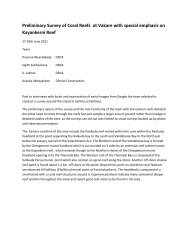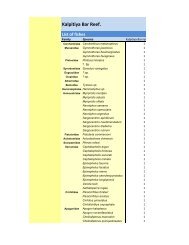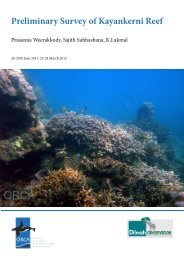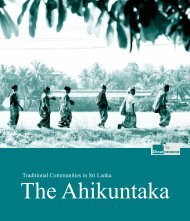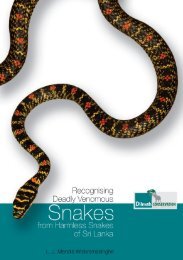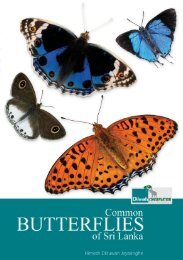Standardised Dugong Questionnair
Standardised Dugong Questionnair
Standardised Dugong Questionnair
Create successful ePaper yourself
Turn your PDF publications into a flip-book with our unique Google optimized e-Paper software.
United Nations Environment Programme<br />
Convention on the Conservation of<br />
Migratory Species of W ild Animals<br />
UNEP/CMS OFFICE – ABU DHABI<br />
United Arab Emirates<br />
STANDARDISED DUGONG CATCH / BYCATCH QUESTIONNAIRE<br />
Interviewer Name: Date: Data Sheet Serial Number:<br />
Town:<br />
Province:<br />
INTRODUCTION STATEMENT<br />
Note: Reading this statement to the interviewee is compulsory. It ensures all interviews are treated equally.<br />
My name is . I work for a project run by the ,<br />
which is an organization based in<br />
(insert location) that supports research to help protect<br />
the ocean for fishers and wildlife. The goal of this project is to learn more about capture of dugongs and any<br />
other marine wildlife in coastal fisheries of<br />
(insert location). In most countries<br />
where dugongs and other marine mammals and sea turtles occur, numbers are small and believed to be<br />
declining. If we wait too long before initiating conservation actions, they will have disappeared before we get the<br />
data to understand the problem. We need to be able to identify the areas where the likelihood of dugongs being<br />
killed is greatest due to hunting, capture in fishing gear and vessel strikes, so that dugongs can be protected.<br />
We hope that your participation in this study will help us learn more about this. Information from our research<br />
could be used to help reduce the capture of dugongs, sea turtles and marine mammals, maybe through<br />
community support for our goals, or possibly through more effective regulations and enforcement. Your<br />
participation in this survey is voluntary and confidential. We will not record your name or any personal<br />
information you share with us unless this is ok with you. Individual answers will be collated and reported on as a<br />
group to provide a general idea of current status, and we will absolutely not share your individual answers to<br />
anyone outside of the research team. You do not have to answer questions you do not want to.<br />
INTERVIEWEE BACKGROUND<br />
Note: Please tick the boxes to the left of any questions not asked. Provide appropriate ID charts and maps for<br />
interviewee to point to during the interview.<br />
1. Name:<br />
2. Age:<br />
3. Gender: Male Female<br />
4. Have you previously participated in interviews related to:<br />
Fishing Marine Mammals MPAs Ecotourism Sea Turtles Other None<br />
When did you participate?<br />
Describe:<br />
5. For how many years has fishing been your occupation?<br />
6. Were your parents fishers? Yes No Grandparents? Yes No<br />
7. Is fishing the main way you earn a living? Yes No<br />
8. Is fishing the only way you earn a living? Yes No<br />
If No, what is (or are) your other occupation(s)?<br />
9. Which months do you normally fish (out of the last 12)?<br />
(if seasonal, indicate season start and end)<br />
UNEP/CMS Office – Abu Dhabi<br />
c/o Environment Agency – Abu Dhabi<br />
Al Mamoura Building A, Al Muroor Road (Street No. 4), P.O. Box 45553, Abu Dhabi, United Arab Emirates<br />
Tel: +971 2 6934 437/523; Fax: +971 2 4997252; Email: CmsOffice.ae@cms.int; Website: www.cms.int
Please tick the boxes to the left of any questions not asked. Provide appropriate ID charts and maps for<br />
interviewee to point to during the interview.<br />
10. How many days each week do you fish? days (low season) days (peak season)<br />
11. What is your position on the boat? The captain A crew member We have no fixed positions<br />
I do not work on a boat<br />
(Skip next questions if this is the response)<br />
12. How many fishers, including yourself, work on the boat?<br />
13. How long is the boat?<br />
(Note to interviewer: convert and provide answer in meters)<br />
14. Is the boat motorized? Yes No (if yes) Inboard Outboard<br />
15. What is the horsepower of the motor?<br />
DUGONG CATCH / BYCATCH<br />
16. Have you ever seen a dugong? Yes No<br />
Do you have another name for it?<br />
17. Tell me about the difference between a dugong and a dolphin?<br />
18. How long do you think a dugong lives? Don’t know<br />
19. How do you get to see dugongs? Seen while fishing Seen while travelling to fishing areas<br />
Accidentally caught in nets Hunted Stranded on the beach Other<br />
Where do you normally fish? (Note to interviewer: Complete attached table and mark all locations on maps)<br />
20. How frequently have you seen dugongs? Never Once in my life Only a few times in my life<br />
Frequently<br />
Every year for the last five years<br />
In the last year, only once several times every month every week every day .<br />
21. Do you have any dugong specialists or catchers in your village? Yes No How many?<br />
22. Have people in your community ever hunted dugongs? Yes No Don’t Know<br />
(if yes) How many (people)?<br />
Do they do so now? Yes No Don’t Know<br />
For how long?<br />
23. Do people from other villagers / communities hunt dugongs? Yes No Don’t Know<br />
Who? What village? Any other details?<br />
Is the catch accidental or on purpose? Accidental On purpose Both<br />
24. Compared to when you started fishing, are there more , less , or the same number of dugongs<br />
captured in fishing gear? Don’t Know (Note to interviewer: based on actual numbers, not perception)<br />
(if more or less) Why do you think this?<br />
25. Do you know of any areas where dugongs regularly occur? Yes No<br />
Where are these dugong areas?:<br />
(Note to interviewer: Regular means certain times of year when they are always found. Indicate on maps)<br />
26. Do these dugong areas change over time? Yes No Don’t Know<br />
27. Have you ever seen dugongs calving? Yes No When? (what month?)<br />
Where did you see them calving? (use maps)?<br />
28. How many dugongs do you think might live in the important areas? 1 10 Don’t Know<br />
2
Please tick the boxes to the left of any questions not asked. Provide appropriate ID charts and maps for<br />
interviewee to point to during the interview.<br />
29. When do you see dugongs? (indicate months or seasons where possible):<br />
30. When was the last time you saw a dugong? (if long time ago note the year)<br />
31. Did you catch any dugongs in the last year? Yes No (accidentally or hunted)<br />
(if yes) How many in the last year? 1-2 ≤10 >10 Specifics (if available):<br />
Was this is a typical number to catch in a year? Yes<br />
No<br />
(if no) Was it higher or lower than usual? Higher Lower<br />
Was the catch accidental or was it something you were fishing for? Accidental Hunted Both<br />
32. How many in the last five years? 0 1-2 ≤10 >10 Specifics (if available):<br />
How many in your life? 0 1-2 ≤10 >10 Specifics (if available):<br />
33. What do you do (or would you do) with a dugong if you caught one? (do not lead interviewee)<br />
Eat Sell Use as Bait Other Use Discard (dead) Release (alive)<br />
34. Have you ever found or heard of dugongs stranded on the shore? Yes No (explain stranded)<br />
Or have you ever found or heard of dugongs dead at sea? Yes No<br />
(if yes) Where (also indicate on maps)?<br />
When and how many?<br />
What happened to the animal?<br />
35. What would you do or did you do if you found a stranded dugong?<br />
PERCEPTIONS<br />
36. Compared to when you started fishing, do you think there are more dugongs , less , or the same<br />
numbers of dugongs<br />
? I don’t know<br />
(if more or less) Why do you think this?<br />
(Note to interviewer: Try to determine what other impacts may be driving the trend)<br />
37. Do you think there will always be dugongs in the sea? Yes No Don’t Know<br />
(if yes or no) Why?<br />
38. Do you think having dugongs around is important? Yes No Don’t know Why?<br />
39. Do you know what seagrass areas are? Yes No (Note to Interviewer: show graphics)<br />
Are there any seagrass areas around here? Yes No Don’t know Where?<br />
(Note to Interviewer: mark on maps)<br />
Do you fish in these seagrass areas? Yes No<br />
Are these seagrass areas important for anything else? Yes No Why?<br />
40. Is it illegal to (intentionally) kill a dugong? Yes No Don’t know<br />
What about by accident (maybe caught in a net unintentionally)? Yes No Don’t know<br />
41. Are any areas routinely / periodically patrolled? Frequently Infrequently Never Don’t know<br />
42. If yes, are penalties ever imposed? Frequently Infrequently Never Don’t know<br />
3
Please tick the boxes to the left of any questions not asked. Provide appropriate ID charts and maps for<br />
interviewee to point to during the interview.<br />
43. Are there any local customs, beliefs, legends or rituals or stories related to dugongs? Yes No<br />
(if yes) Please describe:<br />
Where / from whom did you hear this?<br />
44. Additional stories / incidents you wish to report:<br />
FISHERY INFORMATION<br />
Note to interviewer: Respondent should answer these questions to describe his/her individual experience, not<br />
that of their community. Use illustrations to assist where necessary.<br />
Habitat Codes: (D) Deep Water; (C) Coral; (S) Seagrass; (F) Fine Sediments; (M) Mangroves; (R) Rocks;<br />
(E) Estuaries; (U) Unknown<br />
45. What type of fishing gear do you use? (Indicate what months)<br />
Longline Only Mostly Sometimes Season:<br />
(many hooks) Habitat: Target:<br />
Bottom longline Only Mostly Sometimes Season:<br />
(many hooks set at depth) Habitat:<br />
Target:<br />
Hook and line Only Mostly Sometimes Season:<br />
(one or few hooks) Habitat: Target:<br />
Purse seine Only Mostly Sometimes Season:<br />
(or surround nets) Habitat: Target:<br />
Beach seine Only Mostly Sometimes Season:<br />
Habitat:<br />
Target:<br />
Trawl nets Only Mostly Sometimes Season:<br />
(or other towed net) Habitat: Target:<br />
Traps Only Mostly Sometimes Season:<br />
Habitat:<br />
Target:<br />
Gill or trammel nets Only Mostly Sometimes Season:<br />
Other (describe):<br />
Habitat:<br />
Target:<br />
Do you tend the nets when they are in the water? Yes<br />
How long do you leave the nets in the water?<br />
Do you fish during the day or night ? Both ?<br />
What is the position of the gear? Surface Midwater Bottom<br />
Describe the net: Length Depth Mesh size<br />
Only Mostly Sometimes Season:<br />
Habitat:<br />
Target:<br />
No<br />
hours<br />
4
Please tick the boxes to the left of any questions not asked. Provide appropriate ID charts and maps for<br />
interviewee to point to during the interview.<br />
46. In what places do you normally fish?<br />
(Use prepared road maps, charts, Google maps and have interviewee point out areas)<br />
Do you use different gears in different areas? Yes No If yes, please describe:<br />
(Use prepared road maps, charts, Google maps, and have interviewee point out areas)<br />
47. Do people in your village / community target sharks? Yes No No, but they are occasionally landed<br />
Please elaborate:<br />
(Note to interviewer: This can be area sensitive)<br />
SEA TURTLE CATCH / BYCATCH<br />
(Optional if time permits and interviewee is keen)<br />
48. Have you ever seen sea turtles? Yes No Do you have another name for them?<br />
49. What species of turtles do you see? Green Hawksbill Olive Ridley Loggerhead<br />
Flatback Leatherback Don’t know<br />
Do you know the difference between these turtle species? Yes No Don’t know<br />
(Note to Interviewer; Show ID chart or graphics)<br />
Please describe:<br />
Do they have different names? (if yes) Please list:<br />
50. How long do you think a turtle lives? Don’t know<br />
(determine for each species)<br />
51. How do you get to see turtles? Seen while fishing Seen while travelling to fishing areas<br />
Coming ashore to lay eggs Accidentally caught in nets Hunted Stranded on the beach<br />
Other<br />
(Note to interviewer: Complete attached table and mark all locations on maps)<br />
52. How frequently have you seen turtles? Never Once in my life Only a few times in my life<br />
Frequently<br />
Every year for the last five years<br />
In the last year, only once several times every month every week every day<br />
53. Do you have any turtle experts in your village? Yes No How many?<br />
54. What about in other villages? Yes No Who? What village?<br />
55. Have people in your community ever hunted turtles? Yes No Don’t Know<br />
(if yes) How many?<br />
For how long?<br />
56. Do they do so now? Yes No Don’t Know<br />
57. Do people from other villagers / communities hunt turtles? Yes No Don’t Know<br />
Who? What village? Any other details?<br />
58. Compared to when you started fishing, are there more , less , or the same number of turtles<br />
captured in fishing gear? Don’t Know<br />
(if more or less) Why do you think this?<br />
59. Do you know of any areas where turtles regularly occur? Yes No<br />
Where are these turtle areas?:<br />
(Note to interviewer: also indicate on maps)<br />
(Note to interviewer: based on actual numbers, not perception)<br />
60. Do these turtle areas change over time? Yes No Don’t Know<br />
5
Please tick the boxes to the left of any questions not asked. Provide appropriate ID charts and maps for<br />
interviewee to point to during the interview.<br />
61. Do you see mating turtles? Yes No When? Where (use maps)?<br />
62. How many turtles do you think might live in these areas? 10 >100 Don’t Know<br />
63. When do you see turtles? (indicate months or seasons):<br />
64. When was the last time you saw a turtle? (if a long time ago note the year)<br />
65. Did you catch any turtles in the last year? Yes No<br />
(if yes) How many in the last year? 1-2 ≤10 >10 What species? (if available):<br />
Was this is a typical number to catch in a year? Yes<br />
Was the catch accidental or was it something you were fishing for? Accidental Hunted Both<br />
66. How many in the last five years? 0 1-2 ≤10 >10 Specifics (if available):<br />
67. How many in your life? 0 1-2 ≤10 >10 Specifics (if available):<br />
68. What do you do (or would you do) with a turtle if you caught one?<br />
Eat Sell Use as Bait Other Use Discard (dead) Release (alive) (do not lead interviewee)<br />
(Note differences by species where possible and if available)<br />
69. Have you ever found or heard of turtles stranded on the shore? Yes No (explain stranded)<br />
Or have you ever found or heard of turtles dead at sea? Yes No<br />
(if yes) Where? (also indicate on maps)<br />
When and how many?<br />
What happened to the animal?<br />
70. What would you do or did you do if you found a stranded turtle?<br />
71. Compared to when you started fishing, do you think there are more turtles , less , or the same<br />
numbers of turtles<br />
? I don’t know<br />
(if more or less) Why do you think this?<br />
(Note to interviewer: Try to determine what other impacts may be driving the trend)<br />
72. Do you think there will always be turtles in the sea? Yes No Don’t Know<br />
(if more or less) Why?<br />
73. Do you think having turtles around is important? Yes No Why?<br />
74. It is illegal to (intentionally) kill a turtle? Yes No Don’t know<br />
What about by accident (maybe caught in a net unintentionally)? Yes No Don’t know<br />
75. Are there any local customs, beliefs, legends or rituals or stories related to turtles? Yes No<br />
(if yes) Please describe:<br />
No<br />
Where / from whom did you hear this?<br />
6
Please tick the boxes to the left of any questions not asked. Provide appropriate ID charts and maps for<br />
interviewee to point to during the interview.<br />
DOLPHIN CATCH / BYCATCH<br />
(Optional if time permits and interviewee is keen)<br />
76. Have you ever seen dolphins? Yes No Do you have another name(s) for them?<br />
77. What species of dolphins do you see (describe)?<br />
Any other cetaceans (describe)?<br />
78. How long do you think dolphins live? Don’t know<br />
(list by species)<br />
Don’t know<br />
79. How do you get to see dolphins? Seen while fishing Seen while travelling to fishing areas<br />
Accidentally caught in nets Hunted Stranded on the beach Other<br />
Are these areas different by species? Yes No Don’t Know<br />
(if yes) Please explain:<br />
(Note to interviewer: mark locations on maps by species)<br />
80. How frequently have you seen dolphins? Never Once in my life Only a few times in my life<br />
Frequently<br />
Every year for the last five years<br />
In the last year: Only once Several times Every month Every week Every day<br />
81. Do you have any dolphin experts in your village? Yes No How many?<br />
82. What about in other villages? Yes No Who? What village?<br />
83. Have people in your community ever hunted dolphins or other mammals? Yes No<br />
Don’t Know (if yes) How many? For how long?<br />
84. Do they do so now? Yes No Don’t Know<br />
85. Compared to when you started fishing, are there more , less , or the same number of dolphins<br />
captured in fishing gear? Don’t Know<br />
(if more or less) Why do you think this?<br />
86. Do you know of any areas where dolphins regularly occur? Yes No<br />
Where are these dolphin areas?:<br />
(Note to interviewer: also indicate on maps)<br />
(Note to interviewer: based on actual numbers, not perception)<br />
87. Do these dolphin areas change over time? Yes No Don’t Know<br />
88. How many dolphins do you think might live in these areas? 10 >100 Don’t Know<br />
89. When do you see dolphins? (indicate months or seasons):<br />
90. When was the last time you saw one? (if long time ago note the year)<br />
91. Did you catch any dolphins in the last year? Yes No<br />
(if yes) How many in the last year? 1-2 ≤10 >10 Specifics (if available):<br />
Was this is a typical number to catch in a year? Yes<br />
Was the catch accidental or was it something you were fishing for? Accidental Hunted Both<br />
92. How many in the last five years? 0 1-2 ≤10 >10 Specifics (if available):<br />
93. How many in your life? 0 1-2 ≤10 >10 Specifics (if available):<br />
94. What do you do (or would you do) with a dolphin if you caught one? (do not lead interviewee)<br />
Eat Sell Use as Bait Other Use Discard (dead) Release (alive)<br />
No<br />
7
Please tick the boxes to the left of any questions not asked. Provide appropriate ID charts and maps for<br />
interviewee to point to during the interview.<br />
95. Have you ever found or heard of dolphins stranded on the shore? Yes No (explain stranded)<br />
Or have you ever found or heard of dolphins dead at sea? Yes No<br />
(if yes) Where (also indicate on maps)?<br />
When and how many?<br />
What happened to the animal?<br />
96. What would you do or did you do if you found a stranded dolphin?<br />
97. Compared to when you started fishing, do you think there are more dolphins , less , or the same<br />
numbers of dolphins<br />
? I don’t know<br />
(if more or less) Why do you think this?<br />
(Note to interviewer: Try to determine what other impacts may be driving the trend)<br />
98. Do you think there will always be dolphins in the sea? Yes No Don’t Know<br />
(if more or less) Why?<br />
99. Do you think having dolphins around is important? Yes No Why?<br />
100. It is illegal to (intentionally) kill a dolphin? Yes No Don’t know<br />
What about by accident (maybe caught in a net unintentionally)? Yes No Don’t know<br />
101. Are there any local customs, beliefs, legends or rituals or stories related to dolphins? Yes No<br />
(if yes) Please describe:<br />
Where / from whom did you hear this?<br />
8
Please tick the boxes to the left of any questions not asked. Provide appropriate ID charts and maps for<br />
interviewee to point to during the interview.<br />
CONFIDENTIAL INTERVIEWER COMMENTS<br />
102. How open and honest did the fisher seem about answering bycatch questions?<br />
Very open/honest Somewhat open/honest Not honest<br />
103. How interested and engaged did the fisher seem with interview?<br />
Very interested Moderately interested Bothered/ Not interested<br />
104. How certain did the fisher seem about answers to numerical questions?<br />
Very sure Reasonable sure Unsure<br />
105. How comfortable were you about the respondents' ability to discriminate between the species<br />
Very comfortable Reasonable Not comfortable<br />
106. Why do you think this?<br />
107. Please indicate why (if any) questions were not asked<br />
9
Survey<br />
ID<br />
Number<br />
Sighting<br />
Record<br />
#<br />
#<br />
Individuals<br />
seen<br />
Habitat<br />
Size<br />
S,L<br />
Mother -<br />
Calf Pair<br />
Y / N<br />
Day /<br />
Night<br />
Year<br />
Month<br />
Dead /<br />
Alive<br />
Cause<br />
Condition<br />
Accidental<br />
/ Direct<br />
Reported<br />
Y / N<br />
Notes<br />
Habitat Codes:<br />
Cause:<br />
Condition:<br />
(D) Deep Water; (C) Coral; (S) Seagrass; (F) Fine Sediments; (M) Mangroves; (R) Rocks; (E) Estuaries; (U) Unknown<br />
(G) Gill net, (O) Other Fishing Gear (specify in notes), (B) Boat Strike, (H) Hunting (D) Don’t Know<br />
(F) Fresh, (D) Decomposed<br />
UNEP/CMS Office – Abu Dhabi<br />
c/o Environment Agency – Abu Dhabi<br />
Al Mamoura Building A, Al Muroor Road (Street No. 4), P.O. Box 45553, Abu Dhabi, United Arab Emirates<br />
Tel: +971 2 6934 437/523; Fax: +971 2 4997252; Email: CmsOffice.ae@cms.int; Website: www.cms.int


